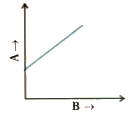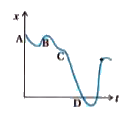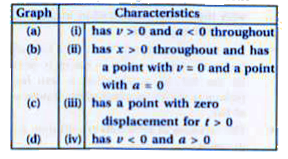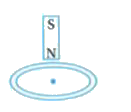Complete Solutions to SECTION-D of chapter MOTION IN A STRAIGHT LINE of Class 11 book with complete answers and questions
| Class 11 | PHYSICS |
| Chapter | MOTION IN A STRAIGHT LINE |
| KUMAR PRAKASHAN | SECTION-D |
| Number Of Questions | 26 |
| Academic Year | 2023-24 |
Among the four graph shown in the figure there is only one graph for which average velocity over the time interval (O,T) can vanish for a suitably chosen T. Which one is it ?
View SolutionA lift is coming from 8th floor and it just a about to reach 4th flor. Taking ground floor as origin and positive direction upwards for all quantities, which one of the following is correct ?
View SolutionIn one dimensional motion, instantaneous speed v satisfies `0 le v lt v _(0).`
View SolutionA person walking in a straight line, covers half of the distance to be travelled with a speed of `v_(0).` For half of the time, required to complete the remaining distance, he walks with a speed of `v_(1)` and for the remaining half time his speed is `v_(2)` What is the person's average speed during this complete walk ?
View SolutionThe displacement of a particle is given by `x = (t-2)^(2)` where x is in metre and t in second. The distance covered by the particle in first 4 seconds is
View SolutionAt a metro station, a girl walks up a stationary escalator in time. `t _(1),`If she remains stationary on the escalator, then the escalator take her up in time `t_(2).` The time taken by her to walk up on the moving escalator will be
View SolutionThe variation of quantity A with quantity B, plotted in figure. Describes the motion of a particle in a straight line.

View SolutionA graph of x versus t is shown in figure. Choose correct alternatives given below.

View SolutionFor the one-dimensional motion, described by x = t - sint
View SolutionA spring with one end attached to a mass and the other to a rigid support is stretched and released.
View SolutionA ball is bouncing elastically with a speed 1 m/s between walls of a railway compartment of size 10 m in a direction perpendicular to walls. The train is moving at a constant velocity of 10 m/s parallel to the direction of motion of the ball. As seen from the ground.
View SolutionRefer to the graph in figure. Match the following

View SolutionA uniformly moving cricket ball is turned back by hitting it with a bat for a very short time interval. Show the variation of its acceleration with time (Take acceleration in the backward direction as positive).
View SolutionGive examples of a one-dimensional motion where
(a) The particle moving along positive x-direction comes to rest periodically and moves forward.
(b) The particle moving along positive x-direction comes to rest periodically and moves backward.
View SolutionGive example of a motion where`x gt 0 , v lt 0, a gt 0` at a particular instant.
View SolutionAn object falling through a fluid is observed to have acceleration given by a = g - bv where g = gravitational acceleration and b is constant. After a long time of release, it is observed to fall with constant speed. What must be the value of constant speed ?
View SolutionAs shown in fig. a metal ring is held horizontally and a bar magnet is dropped through the ring with its length along the axis of the ring. The acceleration of the falling magnet is ……

View SolutionA particle executes the motion described by `x(f) =x_(0) (1- e ^(lamda t) ) , t ge 0, x_(0) gt 0.`
(a) Where does the particle start and with what velocity ? (b) Find maximum and minimum values of x(t), v(t), a(t). Show that X(t) and alt) increase with time and v(t) decreases with time.
View SolutionA bird is tossing (flying to and fro) between two cars moving towards each other on a straight road. One car has a speed of 18 km/h while the other has the speed of 27 km/h. The bird starts moving from first car towards the other and is moving with the speed of 36 km/h and when the two cars were separated by 36 km. What is the total distance covered by the bird?
View SolutionA man runs across the roof, top of a tall building and jumps horizontally with the hope of landing on the roof of the next building which is at a lower height than the first. If his speed is 9 m/s. the horizontal) distance between the two buildings is 10 m and the height difference is 9 m, will be able to land on the next building? (Take g = 10 `m//s^(-2)`)
View SolutionA ball is dropped from a building of height 45 m. Simultaneously another ball is thrown up with a speed 40 m/s. Calculate the relative speed of the balls as a function of time.
View SolutionWrite equation of relation between time period and frequency.
View SolutionIt is a common observation that rain clouds can be at about a kilometer altitude above the ground. (a) If a rain drop falls from such a height freely under gravity, what will be its speed? Also calculate in km/h (g = 10 `m//s^(2)`).
(b) A typical rain drop is about 4 mm diameter. Momentum is mass x speed in magnitude. Estimate its momentum when it hits ground.
(c) Estimate the time required to flatten the drop.
(d) Rate of change of momentum is force. Estimate how much force such a drop would exert on you.
(e) Estimate the order of magnitude force on umbrella. Typical lateral separation between two rain drops is 5 cm.
(Assume that umbrella is circular and has a diameter of 1 m and cloth is not pierced through.)
View SolutionA motor car moving at a speed of 72 km/h cannot come to a stop in less than 3.0 s while for a truck this time interval is 5.0 s. On a highway, the car is behind the truck both moving at 72 km/h. The truck gives a signal that it is going to stop at emergency. At what distance the car should be from the truck so that it does not bump onto (collide with) the truck. Human response time is 0.5 s.
View SolutionA monkey climbs up a slippery pole for 3 and subsequently slips for 3. Its velocity at time t is given by `v (t) = 2t (3 - t), 0 lt t lt 3 and v(t) = -(t - 3) (6-t) for 3 lt tlt 6` s in m/s. It repeats this cycle till it reaches the height of 20 m.
(a) At what time is its velocity maximum ?
(b) At what time is its average velocity maximum ?
(c) At what time is its acceleration maximum in magnitude ?
(d) How many cycles (counting fractions) are required to reach the top ?
View SolutionA man is standing on top of a building 100 m high. He throws two balls vertically, one at t = 0 and after a time interval (less than 2 seconds). The later ball is thrown at a velocity of half the first. The vertical gap between first and second ball is + 15 m at t = 2 s. The gap is found to remain constant. Calculate the velocity with which the balls were thrown and the exact time interval between their throw.
View Solution
SECTION-D questions and complete solutions for chapter MOTION IN A STRAIGHT LINE of KUMAR PRAKASHAN KENDRA PHYSICS (GUJRATI ENGLISH) of Class 11